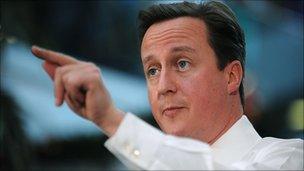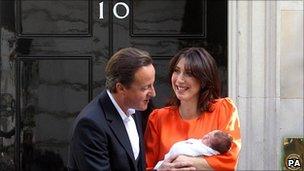Landale Online: The Conservatives' year
- Published

David Cameron is facing unrest from some Tory and Lib Dem MPs
This Christmas David Cameron was supposed to be jetting off to Thailand.
After the year he has had, what could be better than a little winter sun with the family? But the trip was called off.
In a time of austerity, such largesse with his - and the taxpayers' - money might appear, well, a tad out of touch with a nation collectively tightening its belt amid the snow.
Instead, the prime minister will slum it here in the UK at his 1,000-acre mansion at Chequers. Its motto? "All care abandon ye who enter here."
Who could deny Mr Cameron a little respite? This year he fought an election, moved house, got a new job, formed a coalition, lost a father and gained a daughter.
Even for someone with the prime minister's energy, that is quite a year.
For much of the time, he has had the wind in his sails. He took his party back into government for the first time in 13 years. He formed a bold coalition that has a comfortable majority of 82 in the House of Commons.
'Imperial clique'
In its first six months, his government published a Budget and a Spending Review, beginning the deepest, fastest cuts to public spending in living memory.
It began radical reforms to health, education and welfare, changes that would be politically difficult, if not nigh-on impossible, without the political cover and parliamentary arithmetic of a coalition.
This administration has been busy, busy, busy, desperate to avoid the stagnation of the early Blair years.

The Camerons' daughter, Florence, was born while they were on holiday
And yet, note this. David Cameron took a large opinion poll lead into the election and he failed to win. He was forced into coalition. It is from this fact that many of his problems next year may stem.
The Conservative right is restless. Many believe the prime minister has conceded too much ground to the Lib Dems.
They are unhappy that he is not repatriating powers from Europe, that he is allowing Ken Clarke to push community sentences, that they are ignored by what they call an "imperial clique" in Downing Street, that their mainstream conservatism is being replaced by liberal conservatism.
Already some Tory MPs on the right are cooperating with Labour whips, just as they did when they opposed the Maastricht treaty almost 20 years ago.
But David Cameron is also under pressure from the other side of the coalition.
Many Lib Dem MPs feel that they have taken most of the anti-government flak this year - not least over tuition fees - and they want a little payback. They are hoping for some New Year goodies, on, say, control orders, Lords reform, Europe or bank taxes.
But any give and take here would only further inflame the Tory right. Such are Mr Cameron's political choices as he manoeuvres to keep the coalition together.
However, his deeper concerns lie elsewhere. This is the year that the spending cuts will begin to bite.
Thousands in the public sector will start losing jobs. Voters will notice public services being squeezed. Parents and patients will feel the upheaval as health and education reforms begin. How will Mr Cameron respond if waiting times rise, if school standards drop, if there are more demonstrations on the streets?
As Mr Cameron goes for his run around the gardens of Chequers, it will be these spending cuts that he'll mull over, not Business Secretary Vince Cable's latest antics.
- Published28 December 2010
- Published27 December 2010